If further proof of what the epidemiologist Professor Jerry Morris preached - that exercise improves health - were needed, his own longevity confirmed the connection. He died at the age of 99, having led an exemplary active life. At a time when such behaviour was considered quite peculiar, he took to jogging on London's Hampstead Heath. He swam regularly, until the intervention of fellow pool-users wishing to assist what they saw as a fragile, elderly man out of the water persuaded him to stop. Into his ninth decade, he was still taking the stairs to his office as the Professor of Public Health at the London School of Hygiene and Tropical Medicine.
Morris's preferred reading material during the late 1940s comprised the post mortem folios of the London Hospital in the East End for 1907 to 1949. His revelation came about in 1949 after examining data relating to the incidence of heart disease in London busmen. The men observed in the study were of the same social class, but the conductors - who had to ascend and descend 500 to 750 steps per working day - were half as likely as the sedentary drivers to suffer a sudden heart attack. Exercise, he argued, helps you to live longer. It was an idea that dated back to Hippocrates, but it had never been proven conclusively until Morris made it his mission to do so.
In 1953, he published his paper, Coronary Heath-Disease and Physical Activity of Work in the medical journal The Lancet. Further research followed, which corroborated his initial findings: his test group in the 1960s ran to 18,000 desk-bound civil servants. Those who undertook vigorous exercise in their free time were found to be half as likely to have a heart attack as those who preferred the less energetic life.
A self-proclaimed "do-gooder" since his childhood in Glasgow's Southside, Jeremy Noah Morris entered the field of medicine curious as to why different kinds of people got different diseases. At the time, epidemiology was a science still in its infancy. He spent the Second World War in Burma and India. During his service, he published a series of influential papers on juvenile rheumatism, and by the time he returned to London, Britain was leading the field in epidemiology. But he could not convince the government to invest in playgrounds, sports fields and running tracks in a bid to prevent what has become the UK's biggest killer, with 200,000 deaths a year.
Jerry Morris was born on May 6, 1910 and died on October 28. He is survived by his daughter and son. His wife predeceased him.






